Anarchism has had a special interest on the issue of education from the works of William Godwin and Max Stirner onwards.

Summerhill: A Radical Approach to Child Rearing is a book about the English boarding school Summerhill School by its headmaster A. S. Neill. It is known for introducing his ideas to the American public. It was published in America on November 7, 1960, by the Hart Publishing Company and later revised as Summerhill School: A New View of Childhood in 1993. Its contents are a repackaged collection from four of Neill's previous works. The foreword was written by psychoanalyst Erich Fromm, who distinguished between authoritarian coercion and Summerhill.
The free school movement, also known as the new schools or alternative schools movement, was an American education reform movement during the 1960s and early 1970s that sought to change the aims of formal schooling through alternative, independent community schools.
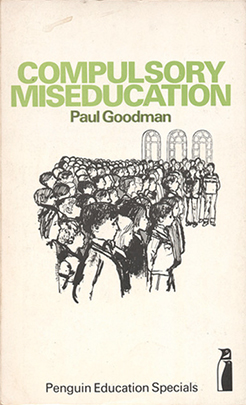
Compulsory Miseducation is a critique of American public schools written by Paul Goodman and published by Horizon Press in 1964. Already established as a social critic of American society and the role of its youth in his previous book Growing Up Absurd (1960), Goodman argues in Compulsory Miseducation against the necessity of schools for the socialization of youth and recommends their abolition. He suggests that formal education lasts too long, teaches the wrong social class values, and increasingly damages students over time. Goodman writes that the school reflects the misguided and insincere values of its society and thus school reformers should focus on these values before schools. He proposes a variety of alternatives to school including no school, the city or farm as school, apprenticeships, guided travel, and youth organizations. Reviewers complimented Goodman's style and noted his deliberate contrarianism, but were split on the feasibility of his proposals. Goodman's book was a precursor to the work of deschooling advocate Ivan Illich.

Fifty Years of Freedom: A Study of the Development of the Ideas of A. S. Neill is a 1972 intellectual biography of the British pedagogue A. S. Neill by Ray Hemmings. It traces how Homer Lane, Wilhelm Reich, Sigmund Freud and others influenced Neill as he developed the "Summerhill idea", the philosophy of child autonomy behind his Summerhill School. The book follows Neill's early life and career in rural, Calvinist Scotland and continues through the influence of his mentors, Lane and Reich, and the origins of Summerhill after World War I. Written fifty years from Summerhill's founding, Fifty Years is a sociological and historical analysis of Neill's ideas in the context of intellectual and educational trends both during Neill's life and at the time of publication. Hemmings also surveyed progressive school leaders about Neill's impact on the field and reported their perception of influence on teacher–pupil relations. Fifty Years was first published in England in 1972 by George Allen and Unwin and was later renamed Children's Freedom: A. S. Neill and the Evolution of the Summerhill Idea for its 1973 American publication by Schocken Books.
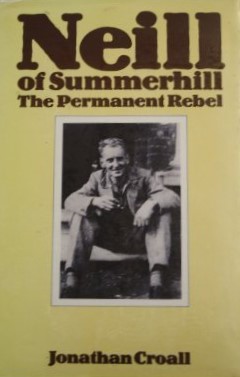
Neill of Summerhill is a 1983 biography of the educator A. S. Neill and his Summerhill School written by Jonathan Croall and published by Knopf Doubleday.

Huck's Raft is a history of American childhood and youth, written by Steven Mintz. The 2006 H-Net review wrote that the book was the best single-volume history of its kind.

Excellent Sheep: The Miseducation of the American Elite and the Way to a Meaningful Life is a 2015 book of social criticism on the role of elite colleges in American society written by William Deresiewicz and published by Free Press. Deresiewicz addresses the pressure of succeeding under which students are put by their parents and by society, considering more particularly the ones that are planning to attend Ivy League universities.

The Community of Scholars is a 1962 book about higher education by Paul Goodman with his observations on its function and proposals for its future.

New Reformation: Notes of a Neolithic Conservative is a 1970 book of social commentary by Paul Goodman best known as his apologia pro vita sua before his death two years later.
The Revisionists Revised is a 1978 history book by Diane Ravitch in criticism of recent "revisionist" works in the history of education that view public schooling as a conspiracy against the working class and human spontaneity. She argues that the goals of public schooling have varied throughout American history and across the country, and though there is disagreement over its intents, that working class people have depended on the school for the futures of their children.
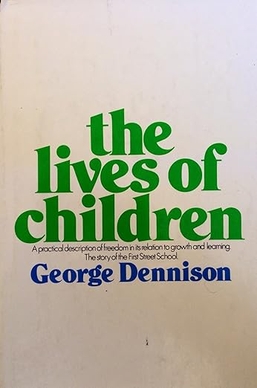
The Lives of Children is a book by George Dennison about the First Street School, a small, alternative mini-school on the Lower East Side of New York City. The school had no administrators, four teachers, and 23 students of integrated racial background. The author establishes a philosophy of education and concept for future schools based on his experiences teaching there.
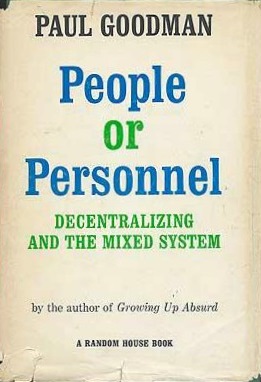
People or Personnel is a critique of centralized power written by Paul Goodman and published by Random House in 1965.

Like a Conquered Province: The Moral Ambiguity of America is a book of Paul Goodman's Massey Lectures for the Canadian Broadcasting Corporation on topics of American pathologies, in particular, citizens not taking responsibility for the consequences of inequality and harmful technologies. He advocates for decentralized alternatives to existing institutions that give greater control to individuals.

Little Prayers and Finite Experience is a book of prose and poetry by Paul Goodman.
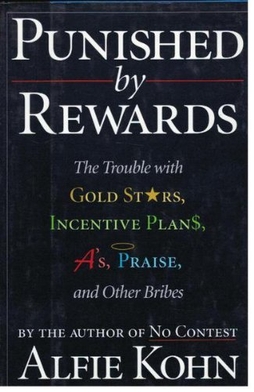
Punished by Rewards: The Trouble with Gold Stars, Incentive Plans, A's, Praise, and Other Bribes is a 1993 book by Alfie Kohn that argues against the use of rewards to incentivize behavior.

Paul Goodman described himself as a man of letters but foremost a poet. He published several poetry collections in his life, including The Lordly Hudson (1962), Hawkweed (1967), North Percy (1968), and Homespun of Oatmeal Gray (1970). His Collected Poems (1973) were published posthumously.
Taylor Stoehr (1931–2013) was an American professor and author. He edited several volumes of Paul Goodman's work as his literary executor.
Abolitionist teaching, also known as abolitionist pedagogy, is a set of practices and approaches to teaching that emphasize abolishing educational practices considered by its proponents to be inherently problematic and oppressive. The term was coined by education professor and critical theorist Bettina Love.
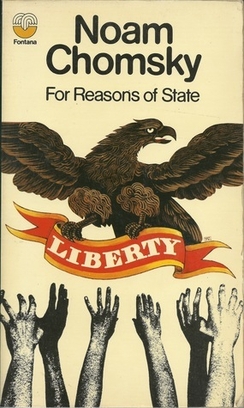
For Reasons of State is a 1973 collection of political essays by Noam Chomsky.















